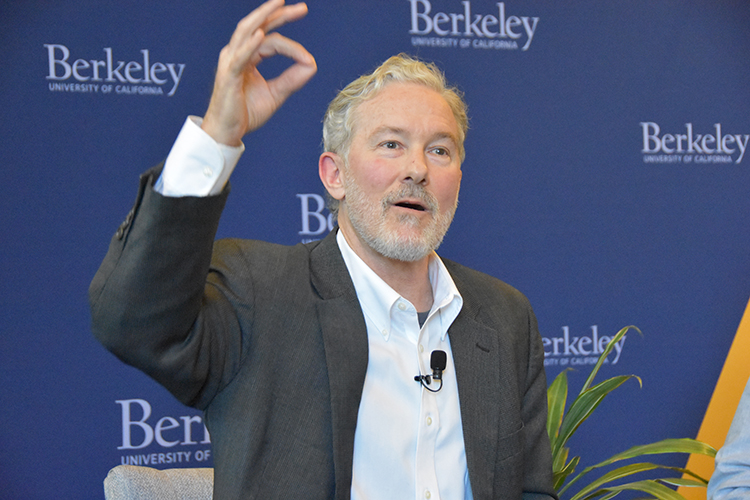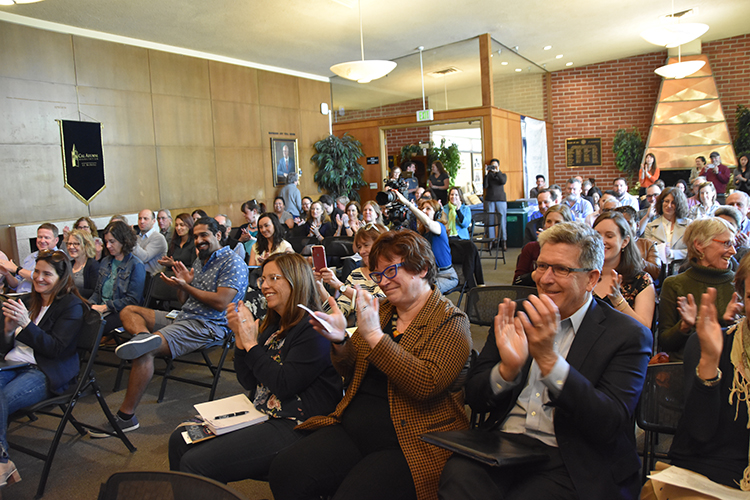Shaping a story that sets Berkeley’s innovators apart from the rest
Chief Innovative and Entrepreneurship Officer Rich Lyons seeks to map a course for UC Berkeley to change the world

February 26, 2020
UC Berkeley’s students and researchers have long challenged the status quo for the good of the public.
Why, wonders Rich Lyons, Berkeley’s first chief innovation and entrepreneurship officer, should the campus’s entrepreneurs think any differently?
Lyons, who began his new role in January, explained his vision for Berkeley’s startup ecosystem on Monday during the latest Campus Conversations event. The monthly series features top Berkeley leaders who address and take questions from staff, faculty and students.
Lyons has been tasked with organizing and championing Berkeley’s portfolio of innovation and entrepreneurship activities and programs, like the startup accelerator Berkeley SkyDeck and the Intellectual Property and Industry Research Alliances, Berkeley’s technology licensing office.
“If we’re talking about a more entrepreneurial and innovative way of contributing to society, then a university that has, in its very DNA, a mindset of ‘questioning the status quo,’ is a pretty valuable asset,” he said. “So, let’s double down on it.”
To draw a contrast, Lyons pointed to a distinct difference between Berkeley and elite private institutions like Harvard, MIT and Stanford.
“What they are going for, in its essence, is exclusivity,” said Lyons. “But Berkeley lives over here on the inclusivity side of the spectrum, and we’re mapping our creativity into an even greater societal benefit.”
Being a changemaker
Lyons’ roadmap is the “Entrepreneurship at Berkeley” report — a year-long study that examined how Berkeley’s innovation and entrepreneurship network could better serve its community.
Key issues include fundraising and ensuring that students from all backgrounds, races, ethnicities and genders feel empowered to start a company or launch an idea.
“Berkeley, and the UC system, is one of the most important institutions in society,” he said. “And the idea that we look so different than the society we serve is going to get more and more troublesome.”

Members of Berkeley’s campus community applaud Lyons after Monday’s Campus Conversation. (UC Berkeley photo by Hulda Nelson)
And building a culture of innovation is more than launching a new technology or engineering startup, Lyons said. Humanities majors need to be ready to change the world, too.
Lyons pointed to a pilot course he launched called “Becoming a Changemaker,” which he hopes will expand into an entire curriculum.
“We need you to live a life of agency,” Lyons said to students in the audience. “It’s about understanding your role, and the traction that your life will have on the world. … And (this course) is going to give you the tools to do that.”
‘Uberization’ of the economy
Lyons said the world needs innovation for the public good, pointing to the rise of artificial intelligence and automation and companies like Lyft and Uber, which have changed the economy.
He said Berkeley has an opportunity to be at the forefront of this research.
“If Berkeley becomes even better known as a place where we resolve some of these open questions, as a practical matter, and in finding the right policy, I don’t think it’s a political risk, if we’re careful,” Lyons said.
Jill Fujisaki, a business services officer with Berkeley’s Division of Computing, Data, Science, and Society, said Lyons desire to reshape campus culture around innovation and entrepreneurship is a great first step to empowering the campus community.
“I think it will really help to inspire and direct people in their everyday lives,” she said. “It’s a really good framework in which everything will flow. I’m very excited that he took this role. I’m looking forward to a lot of great things.”
Campus Conversations will continue on March 3 with outgoing University of California President Janet Napolitano. More information is available on the Campus Conversations website.